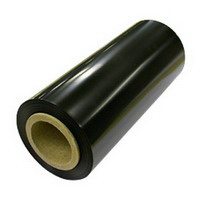PIT1N-B | 1-mil Black Polyimide (Kapton) Film
- 1 mil thick black polyimide film
- No adhesive
- >2,800 breakdown voltage
Product Description
LINQTAPE PIT1N-B is a black high-temperature resistant polyimide film designed for both permanent and temporary bonding in many high-temperature applications. These applications can be found in semiconductor, smartcard, electronic, automotive, and general manufacturing industries. It is ideal for applications that require the balancing of multiple properties over a wide temperature range. LINQTAPE PIT1N-B film provides an excellent balance of electrical, mechanical, thermal, and chemical properties, and can be used in applications that may see temperatures up to 400°C. This film has an opaque black coloring, which results in almost no light transmission, higher heat resistance, and higher resistivity than the standard PIT1N.
LINQTAPE™ PIT1N-B Film comes in 33-meter (36-yard) rolls of varying widths. LINQTAPE PIT-N polyimide films without adhesive are available in a range of thicknesses, starting from 0.5 mil (12.7µm) thickness and up. Custom thicknesses are available upon request.
Key Features:
- High-temperature applications
- Thin film without adhesive
- Excellent electrical properties
Technical Specifications
| General Properties | |||||
| Adhesive Layer Adhesive Layer A layer that is applied to one surface or both to bind items together and resist their separation | None | ||||
| Chemistry Type | Polyimide | ||||
| Color Color The color | Black | ||||
| Film Thickness Film Thickness Film thickness is the thickness of a backing film without taking into account any coatings or adhesive layers. It is measured in micron and the conversion factor to mil is 0.039. | 25.4 µm | ||||
| Special Layer | None | ||||
| Total Thickness Total Thickness Total thickness is taking into account all the films, coatings, adhesives, release liners and special layers and is the maximum thickness of a film or tape. | 25.4 μm | ||||
| Electrical Properties | |||||
| Breakdown Voltage Breakdown Voltage Breakdown voltage is the minimum voltage necessary to force an insulator to conduct some amount of electricity. It is the point at which a material ceases to be an insulator and becomes a resistor that conducts electricity at some proportion of the total current. After dielectric breakdown, the material may or may not behave as an insulator any more because of the molecular structure alteration. The current flow tend to create a localised puncture that totally alters the dielectric properties of the material. This electrical property is thickness dependent and is the maximum amount of voltage that a dielectric material can withstand before breaking down. The breakdown voltage is calculated by multiplying the dielectric strength of the material times the thickness of the film. | 2800 V | ||||
| Surface Resistivity | 10000000000000 Ohms/sq | ||||
| Volume Resistivity Volume Resistivity Volume resistivity, also called volume resistance, bulk resistance or bulk resistivity is a thickness dependent measurement of the resistivity of a material perpendicular to the plane of the surface. | 1.0x1015 Ohms⋅cm | ||||
| |||||
| |||||
| Mechanical Properties | |||||
| Elongation Elongation Elongation is the process of lengthening something. It is a percentage that measures the initial, unstressed, length compared to the length of the material right before it breaks. It is commonly referred to as Ultimate Elongation or Tensile Elongation at break. | 40 % | ||||
| Tensile Strength (Thin Film) Tensile Strength (Thin Film) Tensile strength determines the resistance of a material to break under tension and it measures how much elongating load (or tensile stress) it can handle before fracture. To make it simple, it measures how much force we have to apply when pulling apart a material before it breaks. | 16500 N/cm | ||||



